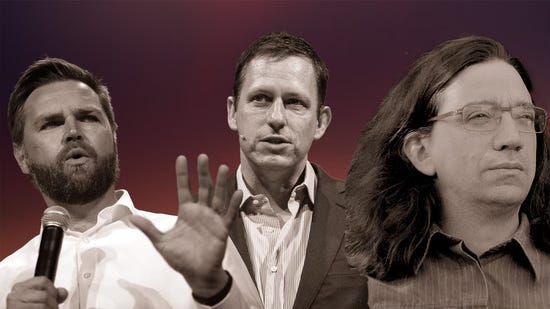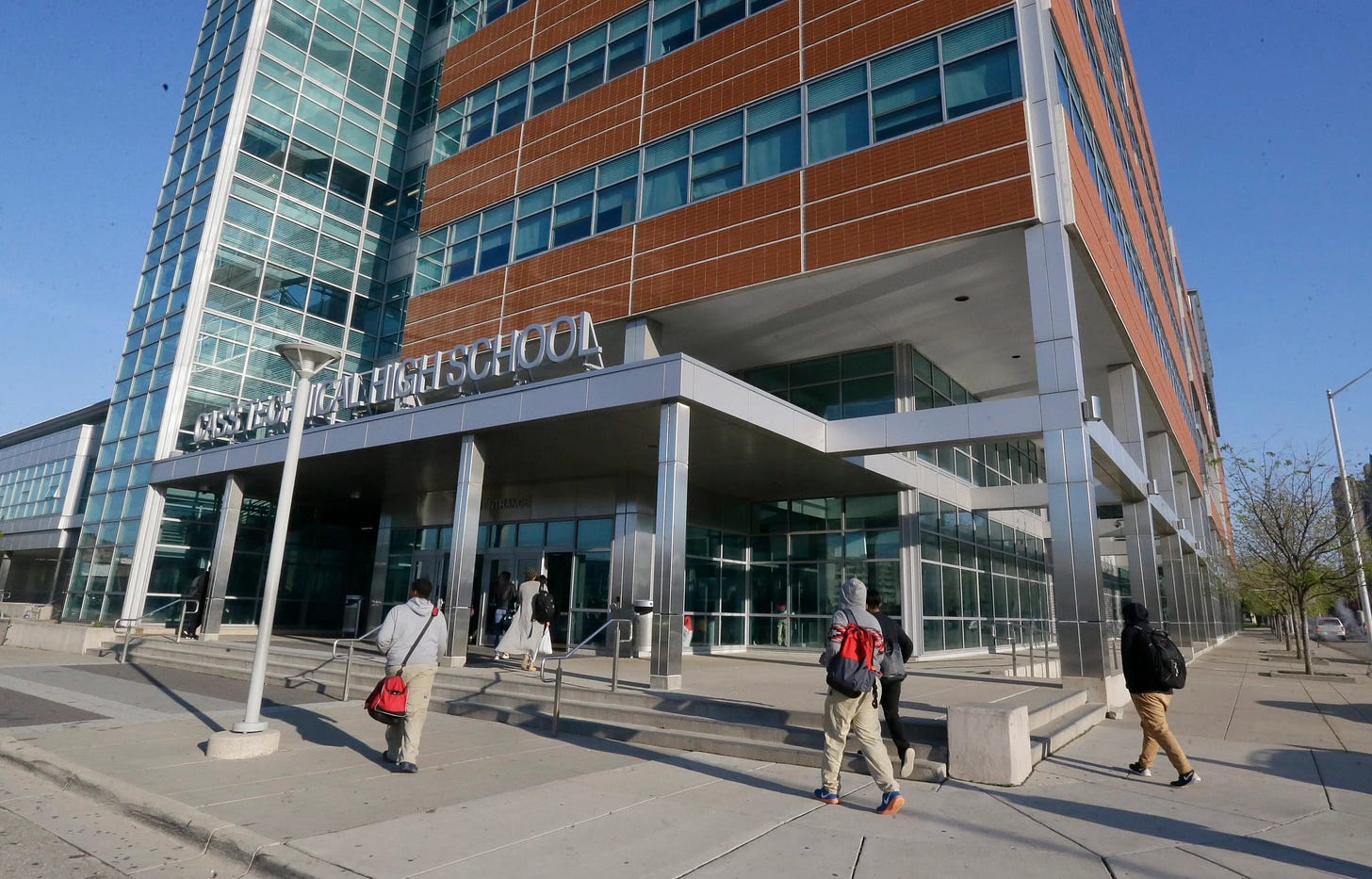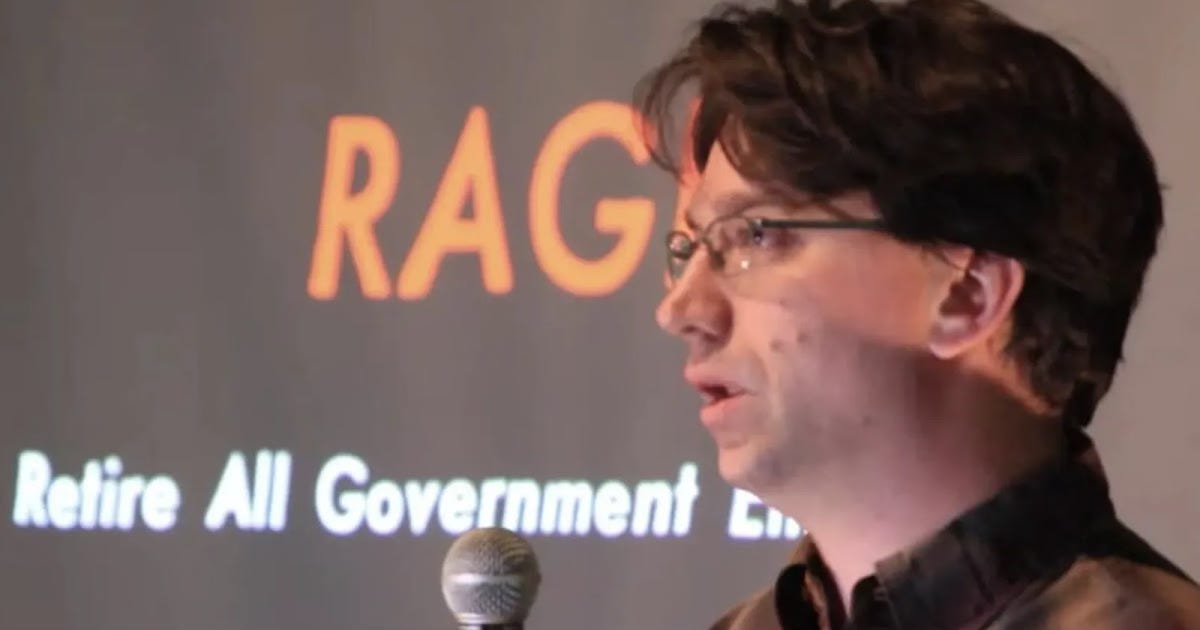The Billionaire Bros are tearing down “The Cathedral”. Here is the REAL motive behind The White House’s closing of The Department of Education.
Spoiler Alert: it isn't for the reasons Conservatives think it is. Here is why both parties- conservative and liberals alike- should be alarmed.
When The White House announced yesterday that it would be closing The Department of Education, I couldn't help but step back and reflect. Some see it as a triumph of states' rights, others as a threat to democratic safeguards.
But as a writer who's been closely following the shifting dynamics of political power away from a democratic government and into the hands of a small number of tech billionaires—I see something deeper and more complex.
If you read my article yesterday about Curtis Yarvin, hopefully you'll recognize how closely this decision aligns with his ideas. If you haven’t yet read it, I strongly encourage you to check it out, linked below, as it provides essential context to understand why this matters.
“The ideal structure of government is not a democracy, but a corporation, because corporations are vastly more effective at achieving objectives.” (Yarvin, Interview with Vox’s Ezra Klein, 2022)
What I didn't fully explore in yesterday’s piece is a key component of Yarvin’s Neoreactionary philosophy—a component that I and many other researchers and journalists are increasingly alarmed to see unfolding right before our eyes: the intentional dismantling of what Yarvin calls “The Cathedral.”
So, who is Curtis Yarvin?
In the late 2000s, Yarvin's blog laid the groundwork for what's now called the neo-reactionary movement (NRx). He fundamentally opposes democracy, calling it inefficient and outdated. Yarvin advocates instead for governments modeled after corporations, with CEOs replacing elected officials and citizens becoming more like commodities of the corporate state (of course we are already considered such- but this is on a much more dehumanized scale.)
Political Impact: A Growing Influence
The crossover into mainstream politics is where Yarvin’s influence truly becomes hard to ignore. Figures such as J.D. Vance, currently the U.S. Vice President, have cited Yarvin as an intellectual inspiration—particularly around reshaping the government bureaucracy to consolidate executive power. Peter Thiel, JD Vance’s primary financial backer and “mentor”, is the closest affiliate of Yarvin (to whom he has funded multiple start ups with). Even Steve Bannon, former White House strategist, reportedly finds value in Yarvin’s critiques, though the extent of their interactions remains somewhat unclear.
Several influential billionaires sympathetic to Yarvin’s critiques of democracy—including Peter Thiel and Elon Musk—have openly expressed doubts about democracy’s viability.
Thiel famously stated:
“I no longer believe that freedom and democracy are compatible.” (Stanford Interview, 2009)
Elon Musk similarly characterized government as:
“Just the largest corporation, with the monopoly on violence, and where you have no recourse.” (Wall Street Journal CEO Council, 2021)
These aren't fringe figures; they represent significant wealth and influence, capable of shaping policy at the highest levels. Yarvin’s philosophies have penetrated Silicon Valley’s power structure, resonating with tech elites like Thiel, Musk, J.D. Vance, and venture capitalists Marc Andreessen and David Sacks. Yarvin’s reach is profound, strategic, and far-reaching, tapping into Silicon Valley’s increasing dissatisfaction with democratic processes.
The Dismantling of “The Cathedral”
“The collection of institutions that generate and regulate information—academia, journalism, education, entertainment—and thus create our culture and determine the boundaries of political reality.” (Mencius Moldbug (Aka Curtis Yarvin), Unqualified Reservations)
As a writer covering the tech billionaire coup in real time, my goal is to connect the dots. The closure of the Department of Education isn’t merely an isolated event. It aligns closely with Yarvin’s theory of "The Cathedral"—his name for the influential institutions (academia, journalism, education, entertainment) that shape our culture and political boundaries.
By dismantling these pillars, Yarvin believes it's possible to reshape society according to a fundamentally anti-democratic vision. It also opens the door for the private entities to step in and subsidize to fill the gaps.
Luckily for the billionaire tech bros who resonate with Yarvins ideas, the conservative right wing also has a view on the education system that can fall in line with the dismantling of it. In fact, it’s two fold: with the belief that for a long time children have been “indoctrinated” by liberal leaning teachers and administration, and that the funds are being wasted frivolously.
On the surface, proponents of smaller government and local control might celebrate such moves. However, historical evidence suggests caution is warranted. When public oversight recedes, powerful private interests, including large corporations or billionaire philanthropists, tend to step into the void, shaping policies to fit their own agendas.
For example, after Detroit’s school system faced massive public funding cuts in 2016, privatized charter schools quickly filled the vacuum, resulting in inconsistent educational outcomes and reduced accountability (National Education Policy Center, 2018). The Brookings Institution also warns that replacing public services with private companies often leads to less transparency and greater inequality (“Privatization of Public Services,” 2020).
Conservative and Liberals alike should be concerned.
Yarvin’s vision isn't confined to any one political ideology; it's about centralizing power away from the broader public.
This raises serious questions we must collectively grapple with. Is this shift simply about reducing government overreach like the Conservative Party is after, or is it the first step toward a society increasingly governed by private interests and billionaire influence?
The closure of the Department of Education neatly aligns with Yarvin’s theories. By eliminating a critical federal body responsible for setting education policies, standards, and funding, the current administration effectively dismantles a key component of Yarvin’s "Cathedral." This isn’t simply about reducing government; it’s about systematically reshaping society’s sources of information and values.
In Yarvin’s view, dismantling democracy isn't a frontal assault; rather, it begins strategically by dismantling these influential institutions, the very pillars that shape society’s collective understanding. It's fascinating—albeit a bit troubling—to watch Yarvin’s concepts take hold among Silicon Valley elites. Billionaire investors like Peter Thiel, a vocal critic of democratic systems and mentor to our sitting Vice President JD Vance, openly resonate with Yarvin's skepticism about democracy's future.
Linked to this strategy is another Yarvin concept known as RAGE—or "Retire All Government Employees." Yarvin describes RAGE as:
“Replacing the entrenched bureaucracy by emptying out agencies entirely. No civil servants, no institutional memory—just a fresh start.” (Vanity Fair, 2022)
This issue transcends conservative or liberal labels. Citizens across the political spectrum harbor legitimate frustrations with government bureaucracy and inefficiency. But the solution Yarvin proposes is profoundly undemocratic: it replaces the public’s voice with the desires of an ultra-wealthy elite.
At this moment, conservative enthusiasm for smaller government provides convenient cover for their agenda. Tomorrow, they might co-opt progressive ideals just as readily—because their true endgame isn't ideological purity; it’s about centralized, unchecked power.
What can we do?
Until the true agenda of the billionaire elite is fully understood by the general public- we are fighting a massive uphill battle.
So, SHARE this information with everyone you know. This article is free, you can start with this. I try to write from a bipartisan perspective as much as *humanly* possible, so share it on your FB regardless of your social circle..
I believe it’s not impossible to stop this. The citizens of the United States have a rare opportunity to come together, across party lines, and unite in this bipartisan issue.
This is a historical moment in history. So, will the history books be written to say that it was the people, across party lines, that saved our independence and freedom? OR will there just not be any history books at all.. At least- none that mention the “coup” that is currently under way.
Let’s stay informed, stay alert, and most importantly, stay engaged. Because the direction of our democracy—and perhaps even the definition of democracy itself—is being reshaped right before our eyes.










Dismantling our government by force is sedition and treason, isn’t it? That’s my read on the definition of each.
They are levying an unconstitutional war on our democracy as they are trying to install an oligarchy run by technocrats. It is about enriching the very richest, killing off those they consider weak or not useful( hence getting rid of Social Security), dumbing people down so they are more apt to be brainwashed….
It is the playbook of the fascist.
Have you ever noticed, one thing these tech bros have in common, is their high opinion of their little “tapa, tapa” computer skills as an “education?” They’re confident nothing happened in the last thousand years that could possibly be of importance to them, and anything resembling a classical university education is beneath them. And they’re also prepared to make those decisions for you.